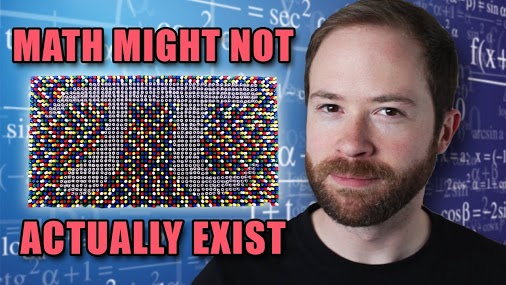Thought-provoking video from PBS on a topic I seldom think about at all, which may be some kind of anxiety-based avoidance resulting from psychological trauma inflicted on me when last I took a math class, integral calculus. Oy vey! That was about the time I realized my strengths lie in the liberal arts and social science realms, not in the math and science realms.
Does Math Objectively Exist, or Is It a Human Creation? A New PBS Video Explores a Timeless Question
June 5th, 2013
In a famous scene from Boswell’s Life of Samuel Johnson, the biographer and his subject come to discuss the bizarre theories of Bishop Berkeley, who posited that everything is immaterial—nothing has any real existence; it’s all just ideal concepts held together by the mind of God. If God should lose his mind or fall asleep or die, everything would fall to pieces or cease to exist. Boswell insists there’s no way to refute the idea. Johnson, kicking a large stone with such force that his foot rebounds, cries, “I refute it thus.”
Johnson’s little demonstration doesn’t actually refute Berkeley’s radical idealism. It’s a conundrum still with us, like Plato’s Euthyphro stumper, which asks whether the rules governing human behavior exist independently of the gods, who simply enforce them, or whether the gods make the rules according to their whims. In other words, is morality objective or subjective? A similar problem occurs when we consider the existence of the rules that govern physical laws—the rules of mathematics. Where does math come from? Does it exist independently of human (or other) minds, or is it a human creation? Do we discover mathematical problems or do we invent them?
The question has engendered two positions: mathematical realism, which states that math exists whether we do or not, and that there is math out there we don’t know yet, and maybe never can. This position may require a degree of faith, since, “unlike all of the other sciences, math lacks an empirical component.” You can’t physically observe it happening. Anti-realists, on the other hand, argue that math is a language, a fiction, a “rigorous aesthetic” that allows us to model regularities in the universe that don’t objectively exist. This seems like the kind of relativism that tends to piss off scientists. But no one can refute either idea… yet. The video above, from PBS’s Idea Channel, asks us to consider the various dimensions of this fascinating and irresolvable question.
Related Content:
- The Math in Good Will Hunting is Easy: How Do You Like Them Apples?
- Incredible Mental Math Gymnastics on “Countdown”
- Math Doodling
~ Josh Jones is a writer and musician based in Washington, DC. Follow him at @jdmagness

No comments:
Post a Comment